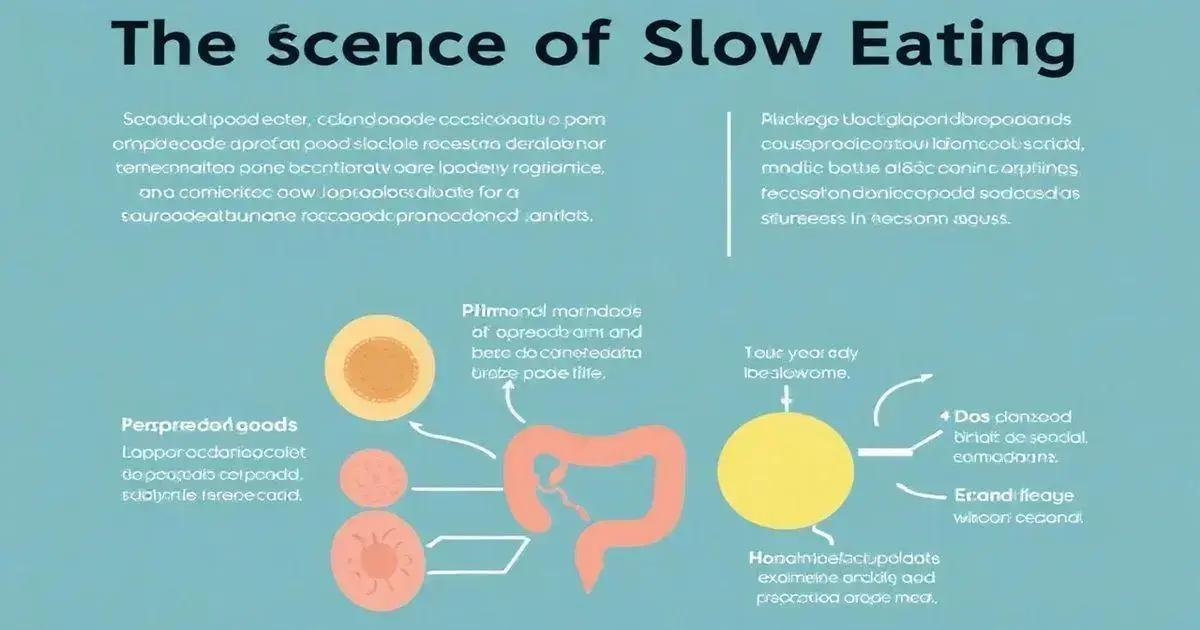The role of slow eating in better digestion and weight control is significant; it improves digestive efficiency, fosters mindful eating, and helps regulate appetite, making it easier to maintain a healthy weight.
Are you looking for effective ways to enhance your digestion and manage your weight? One powerful method is slow eating. By taking your time to chew and savor each bite, you not only improve your digestive process but also create a positive relationship with food. This article delves into the science of slow eating, its benefits for better digestion and weight control, and practical tips on how to integrate this practice into your daily life.
Understanding Slow Eating and Digestion

Slow eating is an important practice that can greatly enhance digestion. When we eat quickly, we often swallow air and undigested food, which can lead to discomfort. Understanding how slow eating impacts digestion is crucial for improving overall health.
How Digestion Works
Digestion begins in the mouth. As we chew, saliva mixes with food, breaking it down. This process prepares the food for the stomach and intestines. Eating slowly allows for more thorough chewing, improving this initial digestive step. The longer food stays in the mouth, the easier it is for our bodies to break it down later.
The Connection Between Eating Pace and Digestion
When we eat too fast, our body may not have enough time to signal satiety. This can lead to overeating, putting extra stress on the digestive system. Eating at a slower pace gives our brain time to realize when we’re full, leading to better portion control and less bloating.
The Role of Mindfulness in Eating
Practicing mindfulness while eating helps improve digestion. By focusing on each bite, you appreciate the flavors and textures, which enhances the eating experience. This mindfulness can reduce stress levels, further aiding digestion. Taking time to appreciate your meal also encourages slower eating.
In summary, slow eating has a direct impact on digestion, making it an essential aspect of achieving better health and weight control.
The Science Behind Slow Eating

The science behind slow eating reveals its many benefits for our health. When we eat slowly, our body has time to signal feelings of fullness. Research shows that slower eating can lead to reduced calorie intake. This is because it takes about 20 minutes for the brain to register that we are full.
Hormonal Response
When we eat, our body releases hormones such as leptin and ghrelin. Leptin informs us when we are full, while ghrelin tells us when we are hungry. Eating slowly allows these hormones to communicate effectively, helping us control our appetite better.
Impact on Digestion
Slow eating also positively impacts digestion. Chewing food thoroughly breaks it down into smaller pieces. This helps our digestive enzymes work more efficiently. Studies suggest that thorough chewing increases nutrient absorption, leading to better overall health.
The Role of Stress
Eating quickly can often be linked to stress, which can negatively affect digestion. When we are stressed, our body may struggle to digest food properly. Slow eating encourages a calm environment, allowing for better digestion as it reduces stress levels.
In summary, science shows that slow eating is essential for effective digestion and weight control. It allows our body and mind to work in harmony.
Benefits of Eating Slowly for Weight Control

Eating slowly can significantly aid in weight control. When we take our time, we are more likely to notice when we are full. This practice helps prevent overeating and encourages healthier portion sizes. By recognizing satiety cues, we can avoid unnecessary calorie intake.
Enhanced Satisfaction
Eating at a slower pace increases meal satisfaction. It allows us to enjoy the flavors and textures of our food, making meals more pleasurable. When we feel satisfied, we are less likely to snack between meals, contributing to weight control.
Better Awareness of Food Choices
When we eat slowly, we become more mindful of what we are eating. This can lead to healthier food choices and improved nutritional habits. Being aware of our food helps us avoid less nutritious options, supporting a balanced diet.
Reduced Emotional Eating
Often, people eat quickly when they’re stressed or upset. Slowing down our eating helps people acknowledge their emotions. This can help differentiate between physical hunger and emotional eating, supporting better weight management.
Overall, the benefits of eating slowly for weight control are numerous. It allows for enhanced awareness, satisfaction, and healthier eating habits.
Practical Tips for Slow Eating

Implementing slow eating into your daily routine can improve digestion and help with weight control. Here are some practical tips for slow eating to consider:
1. Put Down Your Fork
One effective strategy is to put down your fork or spoon between bites. This simple act encourages you to pause and allows time for chewing. By reducing the pace of your eating, you will enjoy your meal more.
2. Chew Thoroughly
Taking the time to chew your food thoroughly benefits digestion. Aim to chew each bite at least 15-20 times. Not only does this help break down food, but it also promotes better nutrient absorption.
3. Use Smaller Plates
Using smaller plates can create the illusion of a fuller plate. This can trick your brain into thinking you are eating more. When you serve meals on smaller dishes, you are likely to eat less while still feeling satisfied.
4. Remove Distractions
Eating in front of the TV or while on your phone can speed up eating. It takes away focus from the meal. By removing distractions, you can concentrate on your food and eat more slowly.
Incorporating these tips into your meals can greatly aid in developing the habit of slow eating, enhancing your overall health.
Embracing Slow Eating for Better Health
Incorporating slow eating into your lifestyle can lead to improved digestion and effective weight control. By understanding the impact of pacing your meals, you can make mindful choices that benefit both your health and well-being.
With practical tips such as chewing thoroughly, using smaller plates, and removing distractions, you’re well on your way to mastering this essential habit. The science behind slow eating highlights its role in enhancing satiety and reducing overeating.
Ultimately, slow eating is not just about physical health; it’s also a way to foster a deeper connection with food, allowing you to enjoy flavors while caring for your body.
FAQ – Frequently Asked Questions about Slow Eating
What is slow eating?
Slow eating is the practice of taking your time while eating, focusing on each bite, and being mindful of the flavors and textures of the food.
How does slow eating improve digestion?
Slow eating enhances digestion by allowing food to be chewed thoroughly, which aids in breaking it down and improving nutrient absorption.
What are the benefits of eating slowly for weight control?
Eating slowly helps regulate appetite, increases satisfaction with meals, and reduces the chances of overeating, making it easier to maintain a healthy weight.
Can slow eating help with emotional eating?
Yes, slow eating encourages mindfulness, allowing individuals to recognize emotional triggers for eating and make more conscious food choices.
What practical tips can I use to practice slow eating?
You can practice slow eating by putting down your utensils between bites, using smaller plates, removing distractions, and chewing your food thoroughly.
How long should I take to eat a meal?
Aim to take at least 20 minutes for a meal. This gives your brain enough time to receive signals of fullness.













